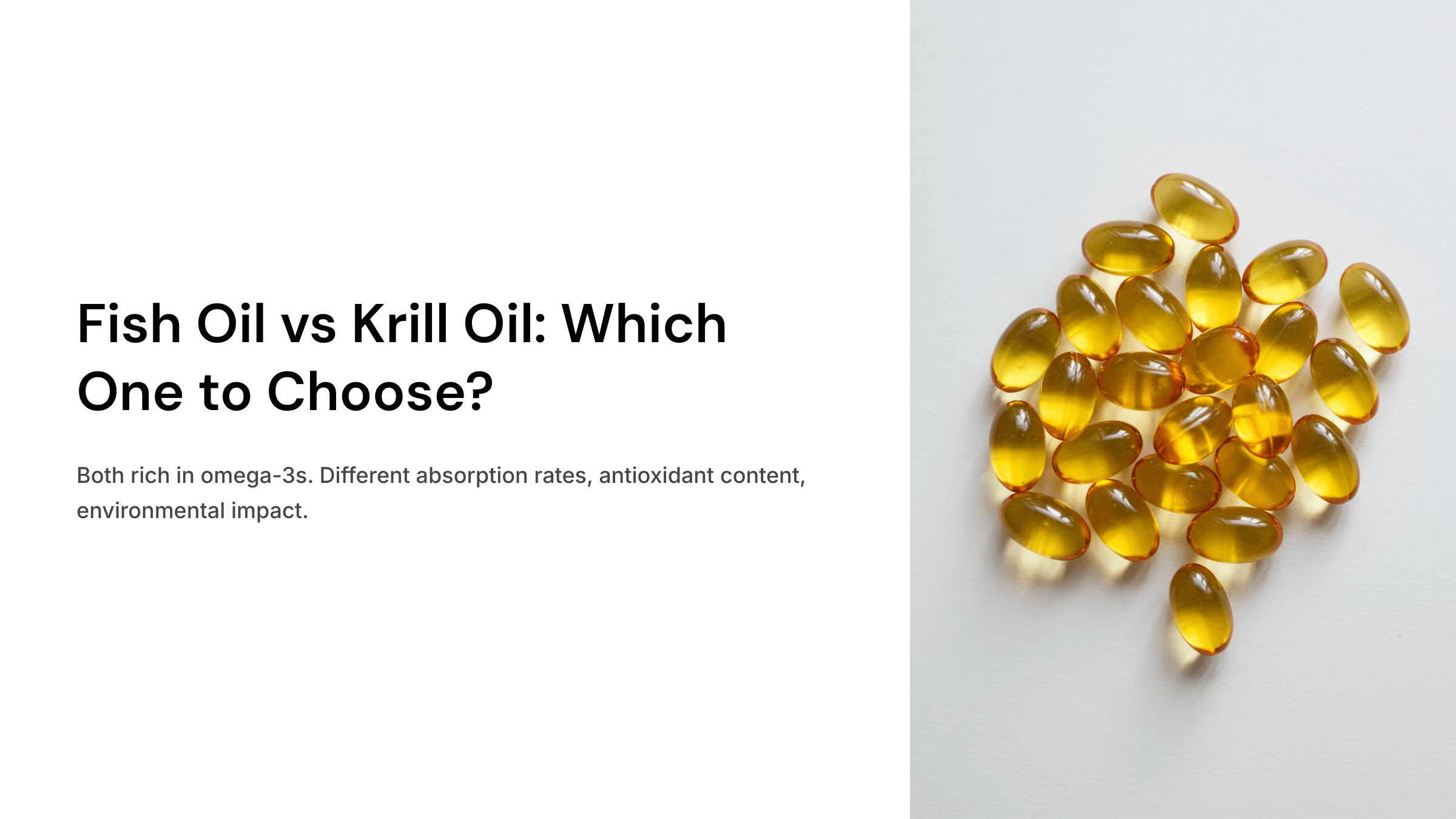Fish Oil vs Krill Oil Benefits: Which One Should You Take?
Think all omega-3 supplements are the same? Think again. While fish oil has been the gold standard for decades, krill oil is gaining popularity for its unique advantages. But which one is truly better for your health?
📋 Contents
Both fish oil and krill oil are rich in omega-3 fatty acids, which support heart health, brain function, and overall well-being. However, they differ in their absorption rates, antioxidant content, and environmental impact. If you’re wondering which one is right for you, this article will break down their differences, benefits, and the best choice for your health goals.
In this comprehensive guide, we’ll compare fish oil vs krill oil based on their nutritional profiles, health benefits, and scientific research.
By the end, you’ll have a clear understanding of which omega-3 supplement is best suited for your lifestyle.
💡 TIP: Omega-3s are essential for your health, but your body doesn’t produce them naturally. That’s why choosing the right supplement is so important!
🐟 What is Fish Oil?
Fish oil is a popular dietary supplement extracted from the tissues of oily fish such as salmon, mackerel, and sardines. It is rich in
omega-3 fatty acids, primarily eicosapentaenoic acid (EPA) and docosahexaenoic acid (DHA), which are known for their anti-inflammatory and heart-health benefits.
How is Fish Oil Made?
Fish oil is obtained by processing fish tissue, extracting the oil, and purifying it to remove contaminants such as mercury and other heavy metals. The oil is then encapsulated in softgel capsules or bottled as a liquid supplement.
Types of Fish Oil
- ✅ Natural Triglyceride Fish Oil: The least processed form, offering higher absorption.
- ✅ Ethyl Ester Fish Oil: More processed, but often has a higher concentration of omega-3s.
- ✅ Re-Esterified Triglyceride Fish Oil: The most refined and bioavailable form.
💎 Key Point:
Fish oil is widely used for heart health, brain function, and reducing inflammation, but its absorption rate varies depending on the form.
🦐 What is Krill Oil?
Krill oil is a newer omega-3 supplement derived from tiny crustaceans called krill, primarily found in the cold Antarctic waters. Unlike fish oil, krill oil contains omega-3s in a phospholipid form, which enhances absorption and bioavailability.
How is Krill Oil Made?
Krill oil is extracted from Antarctic krill using specialized cold-processing techniques to preserve its nutrients. It also naturally contains astaxanthin, a powerful antioxidant that protects against oxidation.
Unique Features of Krill Oil
- ✅ Better Absorption: Omega-3s in phospholipid form are easier for the body to use.
- ✅ Natural Antioxidants: Contains astaxanthin, which fights free radicals.
- ✅ Less Fishy Taste: Many people find krill oil easier to digest with less aftertaste.
💡 TIP: Krill oil is often preferred by those who experience digestive discomfort or “fish burps” after taking fish oil.
⚖️ Fish Oil vs Krill Oil: Key Differences
While both fish oil and krill oil provide essential omega-3 fatty acids, they differ in terms of absorption, antioxidant content, and sustainability. Below is a quick comparison:
| Feature | Fish Oil | Krill Oil |
|---|---|---|
| Omega-3 Form | Triglyceride or ethyl ester | Phospholipid |
| Absorption Rate | Moderate | Higher (better bioavailability) |
| Antioxidant Content | Low | High (contains astaxanthin) |
| Aftertaste | Fishy burps common | Less fishy taste |
| Environmental Impact | Overfishing concerns | More sustainable |
💎 Key Point:
Krill oil absorbs better and has antioxidant protection, while fish oil provides a higher overall omega-3 dose at a lower price.
💪 Health Benefits of Fish Oil
Fish oil is one of the most researched supplements, known for its extensive health benefits, primarily due to its high EPA and DHA content.
From improving heart health to supporting brain function, here’s how fish oil can benefit you.
1️⃣ Supports Heart Health
- ✅ Reduces triglyceride levels, lowering the risk of heart disease.
- ✅ Helps maintain healthy blood pressure levels.
- ✅ May prevent arterial plaque buildup, promoting better circulation.
💡 TIP: The American Heart Association recommends eating two servings of fatty fish per week or supplementing with fish oil for heart health.
2️⃣ Enhances Brain Function and Mental Health
- ✅ Supports cognitive function, especially in aging adults.
- ✅ May reduce symptoms of depression and anxiety.
- ✅ DHA is a crucial component of brain cell membranes.
3️⃣ Reduces Inflammation
- ✅ Helps manage inflammatory conditions like arthritis.
- ✅ May aid in muscle recovery after exercise.
💎 Key Point:
Fish oil is best for individuals looking to improve heart health, brain function, and inflammation control.
❤️ Health Benefits of Krill Oil
Krill oil offers many of the same benefits as fish oil but with enhanced absorption and antioxidant protection due to its phospholipid structure and astaxanthin content.
1️⃣ Higher Bioavailability for Better Absorption
- ✅ The omega-3s in krill oil are absorbed more efficiently than those in fish oil.
- ✅ This means you may need a smaller dose to get the same benefits.
2️⃣ Powerful Antioxidant Protection
- ✅ Contains astaxanthin, which helps protect cells from oxidative damage.
- ✅ Supports healthy aging and reduces free radical damage.
3️⃣ Supports Joint and Brain Health
- ✅ Studies suggest krill oil may be particularly effective for reducing arthritis symptoms.
- ✅ Improves memory and cognitive performance.
💡 TIP: Krill oil may be a better option for people with digestive sensitivity since it’s easier on the stomach than fish oil.
💎 Key Point:
Krill oil is best for those who want better absorption, antioxidant support, and joint health benefits.
🤔 Which One Should You Choose?
Now that we’ve explored the differences and benefits of fish oil vs krill oil, you might be wondering: Which one is best for me?
The answer depends on your health goals, budget, and personal preference.

Fish Oil is Best For:
- ✅ Those looking for a cost-effective omega-3 supplement.
- ✅ People who need a higher dose of EPA and DHA.
- ✅ Individuals focused on heart and brain health.
Krill Oil is Best For:
- ✅ Those who want better absorption and a smaller dosage.
- ✅ People who prefer an omega-3 supplement with antioxidant protection.
- ✅ Individuals looking for a more sustainable, eco-friendly option.
⚠️ WARNING: If you have a seafood allergy, consult your doctor before taking fish oil or krill oil.
💎 Key Point:
Fish oil provides a high dose of omega-3s at a lower price, while krill oil offers better absorption and antioxidant benefits.
❓FAQ About Fish Oil vs Krill Oil
💊 Can I take fish oil and krill oil together?
Yes, but it’s usually unnecessary. Both provide omega-3s, so taking one high-quality supplement should be enough.
🕒 How long does it take for omega-3 supplements to work?
It typically takes 6-12 weeks of consistent use to notice benefits such as improved heart health or reduced inflammation.
🤢 Does krill oil have a fishy aftertaste like fish oil?
No, krill oil is less likely to cause “fish burps” because its phospholipid structure makes it easier to digest.
🌱 Is krill oil more sustainable than fish oil?
Yes, krill oil is generally considered more sustainable because krill populations are abundant, and harvesting is strictly regulated.
🔍 Final Thoughts: Fish Oil vs Krill Oil
When it comes to choosing between fish oil vs krill oil, the decision depends on your priorities.
If you want a cost-effective, high-dose omega-3 supplement, fish oil is a great choice.
On the other hand, if you prefer better absorption, antioxidant protection, and sustainability, krill oil is the superior option.
Regardless of your choice, adding omega-3s to your diet can have profound health benefits, including supporting heart health, brain function, and reducing inflammation.
Just make sure to choose a high-quality supplement from a reputable brand.
💡 TIP: Always check for third-party testing to ensure purity and potency when buying fish oil or krill oil supplements.
Now, over to you! Have you tried fish oil or krill oil? What has your experience been like?
Let us know in the comments below! 💬
For other heart health supplements, check out our guide to CoQ10 for more information.


